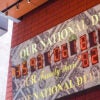
The Wall Street Journal reports today:
Banks are considering additional fees on credit cards and checking accounts. But they also are looking at new ways to make money on cash machines and especially debit cards as regulators pinch the cards’ conventional revenue streams.
And what exactly is to blame for all of these new fees and restrictions? WSJ reports: “The proposals, released last month, are part of the Dodd-Frank financial-overhaul bill that was enacted last year.” So much for Congress’ claim that Dodd-Frank would save consumers money. Before the bill was passed, Heritage Foundation analysts David John and James Gattuso predicted:
The bill would also eliminate part of the fees paid by retailers to credit card companies for the use of debit cards. The part that is being eliminated goes to the financial institution that issues the card, and the loss of this income may cause certain issuers to either drop their cards or limit their availability. This fee applies only to large banks, with fees going to smaller financial institutions, state governments that use debit cards to pay certain types of benefits, and certain other card issuers still being allowed.
…
Rather than make the financial system safer, it reduces firms’ ability to handle risk. And rather than help consumers, it raises their costs, reduces their choices, and hinders the capital formation necessary to make them more prosperous.
Also in the WSJ, George Mason University Law School Professor Todd Zywicki detailed yesterday how Dodd-Frank was enabling the return of the loan shark:
And how will the market respond to the so-called Durbin Amendment to the Dodd-Frank banking reform law, which places price controls on debit-card interchange fees (which retailers pay for accepting cards)?
Pursuant to the law, the Federal Reserve announced before Christmas that it plans to slash the interchange rate to between 7 cents and 12 cents, a 90% cut from the current rate. While this will provide a major windfall to big-box retailers and other merchants, the impact on consumers will be devastating—and again low-income consumers will be the hardest hit.
…
Many low-income Americans will be unable to qualify for free checking under the new fee regime, meaning they will have to pay higher fees or simply drop out of the banking system. Financial products that cater to unbanked consumers—check cashers, pawn shops, purveyors of nonbank prepaid cards—can expect to benefit from the Durbin Amendment, just as payday lenders have prospered as a result of credit-card regulations.Nontraditional financial products serve an important role in the marketplace for the millions of consumers who count on them. Even pawn shops and loan sharks are more palatable and less expensive than the bounced checks and utility shut-offs that would result in their absence. Still, low-income consumers aren’t better off when they have to rely on such lenders because paternalistic regulations have deprived them of a credit card. And just wait until the Consumer Financial Protection Bureau comes on line, increasing costs and further restricting credit for low-income consumers.






























13 Replies to “Dodd-Frank Already Failing Consumers”